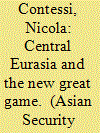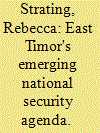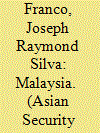|
|
|
Sort Order |
|
|
|
Items / Page
|
|
|
|
|
|
|
| Srl | Item |
| 1 |
ID:
124876


|
|
|
|
|
| Publication |
2013.
|
| Summary/Abstract |
In the 20 years since independence from the former Soviet Union, the study of Eurasia in International Relations (IR) has received considerable impetus in both the academic and policy circles. Specialized news and analysis outlets have come online, research centers have multiplied within universities, and a variety of think tanks now host dedicated programs. In other words, this still relatively little-known region has glamour. Yet Eurasia remains difficult to situate as an object of study due to its distinctive hybridity: geographical, at the crossroads between Europe and Asia; cultural, Muslim Russianspeaking Turkic peoples with Asian traits and traditions; political, straddling Western and Asian institutional forms domestically, and contiguous to Europe, Asia, Russia, the Middle East, and Afghanistan internationally. Partly as a result of this hybridity, Eurasia is a somewhat elusive object of study. At a minimum, it comprises the two subregions on each shore of the Caspian basin: Central Asia to the east and the Caucasus to the west. Reflecting this elusiveness, Central Asian states (CAS) belong to the Asia-Pacific Regional Group at the United Nations; they are members of the Asian Development Bank and the Economic Commission for the Asia-Paci?c. At the same time, they are members of the Organization for Security and Cooperation in Europe (OSCE), the European Bank for Reconstruction and Development, and the Euro-Atlantic Partnership Council, a North Atlantic Treaty Organization (NATO) ancillary forum. But they also have distinctly Central Asian groupings, such as the Eurasian Development Bank, the UN-af?liated Central Asian Regional Information and Coordination Center, not to mention the Shanghai Cooperation Organization (SCO) and Collective Security Treaty Organization (CSTO). Similarly, the three Caucasian states share most of the same af?liations, except for belonging to the East European Regional Group at the UN
|
|
|
|
|
|
|
|
|
|
|
|
|
|
|
|
| 2 |
ID:
124874


|
|
|
|
|
| Publication |
2013.
|
| Summary/Abstract |
This article focuses on the steps East Timor has taken to bolster its defense sector following its attainment of independence in 2002. In International Relations, scholars have often argued that the ability to defend territory and population from external threat is an essential component of sovereign statehood. Literature on post-colonial sovereignty, however, suggests that the external sovereignty of "weak" post-colonial states is more likely to be protected through international legal recognition. In recent years, East Timor has sought to develop their defense capacities in line with conventional thinking about security and "real" independence. This influences the foreign relations of East Timor and also has broader implications for understanding security and independence in post-colonial states.
|
|
|
|
|
|
|
|
|
|
|
|
|
|
|
|
| 3 |
ID:
124875


|
|
|
|
|
| Publication |
2013.
|
| Summary/Abstract |
The October 2012 Framework Agreement on the Bangsamoro between the Philippines and the Moro Islamic Liberation Front was a milestone in the peace negotiations. Attributing this success solely to Philippine President Benigno Aquino III's popularity fails to account for Malaysia's peace facilitation. Keeping the talks on track appeared counterintuitive as Filipino public opinion often cast Malaysia as a dishonest broker. Contrary to popular belief, Kuala Lumpur's foreign policy eschewed support for Moro secession. More importantly, the effectiveness of the Malaysian-led International Monitoring Team as a peacekeeping force fostered peace in communities. This article illustrates how mediation and local-level peace can trump national-level rhetoric
|
|
|
|
|
|
|
|
|
|
|
|
|
|
|
|
| 4 |
ID:
124872


|
|
|
|
|
| Publication |
2013.
|
| Summary/Abstract |
This article explains Malaysia's US policy under Prime Minister Najib. It argues that to the extent that there is a "shift" in Malaysia's policy, its substance has been shaped by structural and domestic considerations. Structurally, in the face of a fast rising China, Malaysia is compelled to keep a more balanced relationship with all the major powers. This structural push, reinforced by Obama's "pivot," has been nonetheless limited by a concern about the risks of entrapment, abandonment, and antagonism. Domestically, there are economic and political motivations to develop closer ties with Washington. These, however, have been counteracted by a calculation of not wanting to align too closely with America. These structural and domestic determinants together explain the smaller state's strategy towards the superpower at a time of systemic change.
|
|
|
|
|
|
|
|
|
|
|
|
|
|
|
|
| 5 |
ID:
124873


|
|
|
|
|
| Publication |
2013.
|
| Summary/Abstract |
This article explores the possible long-term trajectory of America's "pivot" to the Asia-Pacific and its implications for Canada's security policy. It shows that Obama's pivot represents the beginnings of a strategic choice on "selective primacy," which, due to Washington's worrisome fiscal situation and push towards a more specialized force structure, promises to only deepen in the future. In the second half of the article, I examine how Canada will likely respond to America's more sustained strategic adjustment to the Pacific based on a reading of how the country traditionally adapts to American strategic preferences. The article concludes with some thoughts on an expanded Canadian effort at maritime diplomacy and the future of a Pacific-centric Royal Canadian Navy.
|
|
|
|
|
|
|
|
|
|
|
|
|
|
|
|
|
|
|
|
|